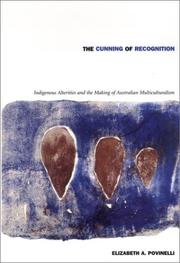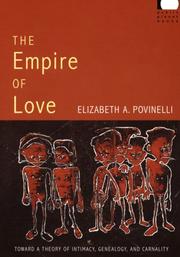| Listing 1 - 10 of 15 | << page >> |
Sort by
|
Book
ISBN: 9780822350668 9780822350842 0822350661 082235084X Year: 2011 Publisher: Durham, N.C. Duke university press
Abstract | Keywords | Export | Availability | Bookmark
 Loading...
Loading...Choose an application
- Reference Manager
- EndNote
- RefWorks (Direct export to RefWorks)
"In Economies of Abandonment, Elizabeth A. Povinelli explores how late liberal imaginaries of tense, eventfulness, and ethical substance make the global distribution of life and death, hope and harm, and endurance and exhaustion not merely sensible but also just. She presents new ways of conceptualizing formations of power in late liberalis - the shape that liberal governmentality has taken as it has responded to a series of legitimacy crises in the wake of anticolonial and new social movements and, more recently, the "clash of civilizations" after September 11. Based on longstanding ethnographic work in Australia and the United States, as well as critical readings of legal, academic, and activist texts, Povinelli examines how alternative social worlds and projects generate new possibilities of life in the context of ordinary and extraordinary acts of neglect and surveillance. She focuses particularly on social projects that have not yet achieved a concrete existence but persist at the threshold of possible existence. By addressing the question of the endurance, let alone the survival, of alternative forms of life, Povinelli opens new ethical and political questions"--Back cover.
Liberalism --- Social structure. --- #SBIB:39A4 --- #SBIB:321H50 --- Organization, Social --- Social organization --- Anthropology --- Sociology --- Social institutions --- Liberal egalitarianism --- Liberty --- Political science --- Social sciences --- Social aspects --- Toegepaste antropologie --- Westerse politieke en sociale theorieën vanaf de 19e eeuw: liberalisme --- Liberalismus. --- Soziale Situation. --- Australien. --- USA. --- Social structure
Book
ISBN: 9780822362333 9780822362111 0822362112 0822362333 Year: 2016 Publisher: Durham (N.C.) Duke University Press
Abstract | Keywords | Export | Availability | Bookmark
 Loading...
Loading...Choose an application
- Reference Manager
- EndNote
- RefWorks (Direct export to RefWorks)
Ethnology --- Life. --- Ontology. --- Liberalism. --- Liberalismus. --- Macht. --- Aborigines. --- Philosophie. --- Philosophy. --- Siedler, ... --- Australien. --- #SBIB:39A3 --- Antropologie: geschiedenis, theorie, wetenschap (incl. grondleggers van de antropologie als wetenschap)
Book
ISBN: 9781478013648 1478013648 9781478014577 1478014571 Year: 2021 Publisher: Durham (N.C.) : Duke university press,
Abstract | Keywords | Export | Availability | Bookmark
 Loading...
Loading...Choose an application
- Reference Manager
- EndNote
- RefWorks (Direct export to RefWorks)
"Between Gaia and Ground examines four axioms of existence that have emerged in recent years across a significant segment of critical theory: the entanglement of existence; the unequal distribution of power to affect the local and transversal terrains of this entanglement; the multiplicity and collapse of the event as the sine qua non of political thought; and the racial and colonial history that informed modern western ontologies and epistemologies and the concept of the west as such. Beyond these axioms, Between Gaia and Ground is interested in the broader anticolonial struggles from which they emerged and a reactionary formation, late liberalism, which has attempted to remold, blunt, and redirect these struggles in the context of contemporary climatic, environmental, viral and social collapse. Elizabeth Povinelli treats these axioms as distinct theoretical statements, demonstrating that they are part of much broader discursive surfaces reflecting opposing currents in the direction of political thought and action in the wake of geontopower. Between Gaia and Ground seeks to show how a seemingly casual syntactic arrangement of theoretical statements results in dramatically differing paradigms for figuring the present as a coming catastrophe (l'catastrophe à venir) and as an ancestral one (l'catastrophe ancestral/histoire)"--
Ontology --- Biopolitics --- Ecology --- Postcolonialism --- Liberalism --- Power (Philosophy) --- Human ecology --- Critical theory --- Free enterprise --- #SBIB:39A3 --- #SBIB:39A4 --- #SBIB:1H30 --- Free markets --- Laissez-faire --- Markets, Free --- Private enterprise --- Economic policy --- Critical social theory --- Critical theory (Philosophy) --- Critical theory (Sociology) --- Negative philosophy --- Criticism (Philosophy) --- Philosophy, Modern --- Rationalism --- Sociology --- Frankfurt school of sociology --- Socialism --- Environment, Human --- Human beings --- Human environment --- Ecological engineering --- Human geography --- Nature --- Authority --- Ethics --- Philosophy --- Liberal egalitarianism --- Liberty --- Political science --- Social sciences --- Post-colonialism --- Postcolonial theory --- Decolonization --- Ecophilosophy --- Political behavior --- Human behavior --- Sociobiology --- Being --- Metaphysics --- Necessity (Philosophy) --- Substance (Philosophy) --- Antropologie: geschiedenis, theorie, wetenschap (incl. grondleggers van de antropologie als wetenschap) --- Toegepaste antropologie --- Filosofie van de mens, wijsgerige antropologie --- Social aspects --- Effect of environment on --- Effect of human beings on --- Ontology. --- Biopolitics. --- Postcolonialism. --- Liberalism. --- Human ecology. --- Critical theory. --- Philosophy. --- Ontologie --- Biopolitique --- Écologie --- Postcolonialisme --- Libéralisme --- Pouvoir (Morale) --- Écologie humaine --- Théorie critique --- Philosophie --- Biopolitique. --- Free enterprise. --- Libéralisme. --- Ontologie. --- Postcolonialisme. --- Pouvoir (Morale). --- Power (Philosophy). --- Théorie critique. --- critical theories (dialectical critiques). --- critical theory (sociological concept). --- human ecology. --- liberalism. --- ontology (metaphysics). --- postcolonialism. --- Écologie humaine. --- Philosophie.

ISBN: 0226676749 Year: 1993 Publisher: Chicago (Ill.) : University of Chicago press,
Abstract | Keywords | Export | Availability | Bookmark
 Loading...
Loading...Choose an application
- Reference Manager
- EndNote
- RefWorks (Direct export to RefWorks)
Aboriginal Australians --- Aboriginal Australians --- Aboriginal Australians --- Hunting and gathering societies. --- Land use --- Land tenure --- Economic conditions. --- Ethnic identity.

ISBN: 0822328534 0822328682 Year: 2002 Publisher: Durham, N.C. Duke University Press
Abstract | Keywords | Export | Availability | Bookmark
 Loading...
Loading...Choose an application
- Reference Manager
- EndNote
- RefWorks (Direct export to RefWorks)
Digital
ISBN: 9780822373810 Year: 2016 Publisher: Durham Duke University Press Books
Abstract | Keywords | Export | Availability | Bookmark
 Loading...
Loading...Choose an application
- Reference Manager
- EndNote
- RefWorks (Direct export to RefWorks)
In *Geontologies* Elizabeth A. Povinelli continues her project of mapping the current conditions of late liberalism by offering a bold retheorization of power. Finding Foucauldian biopolitics unable to adequately reveal contemporary mechanisms of power and governance, Povinelli describes a mode of power she calls geontopower, which operates through the regulation of the distinction between Life and Nonlife and the figures of the Desert, the Animist, and the Virus. Geontologies examines this formation of power from the perspective of Indigenous Australian maneuvers against the settler state. And it probes how our contemporary critical languages — anthropogenic climate change, plasticity, new materialism, antinormativity — often unwittingly transform their struggles against geontopower into a deeper entwinement within it. A woman who became a river, a snakelike entity who spawns the fog, plesiosaurus fossils and vast networks of rock weirs: in asking how these different forms of existence refuse incorporation into the vocabularies of Western theory Povinelli provides a revelatory new way to understand a form of power long self-evident in certain regimes of settler late liberalism but now becoming visible much further beyond.
Ethnology. Cultural anthropology --- ontology [metaphysics] --- liberalism
Digital
ISBN: 9781478021872 Year: 2021 Publisher: Durham Duke University Press Books
Abstract | Keywords | Export | Availability | Bookmark
 Loading...
Loading...Choose an application
- Reference Manager
- EndNote
- RefWorks (Direct export to RefWorks)
*Between Gaia and Ground* examines four axioms of existence that have emerged in recent years across a significant segment of critical theory: the entanglement of existence; the unequal distribution of power to affect the local and transversal terrains of this entanglement; the multiplicity and collapse of the event as the sine qua non of political thought; and the racial and colonial history that informed modern western ontologies and epistemologies and the concept of the west as such. Beyond these axioms, *Between Gaia and Ground* is interested in the broader anticolonial struggles from which they emerged and a reactionary formation, late liberalism, which has attempted to remold, blunt, and redirect these struggles in the context of contemporary climatic, environmental, viral and social collapse. Elizabeth Povinelli treats these axioms as distinct theoretical statements, demonstrating that they are part of much broader discursive surfaces reflecting opposing currents in the direction of political thought and action in the wake of geontopower. Between Gaia and Ground seeks to show how a seemingly casual syntactic arrangement of theoretical statements results in dramatically differing paradigms for figuring the present as a coming catastrophe (l'catastrophe à venir) and as an ancestral one (l'catastrophe ancestral/histoire).
Ethnology. Cultural anthropology --- ontology [metaphysics] --- liberalism --- postcolonialism

ISBN: 082233836X 0822338890 9780822338369 9780822338895 Year: 2006 Publisher: Durham Duke university press
Abstract | Keywords | Export | Availability | Bookmark
 Loading...
Loading...Choose an application
- Reference Manager
- EndNote
- RefWorks (Direct export to RefWorks)
Intimacy (Psychology) --- Love --- Power (Social sciences) --- Social structure

ISBN: 9780822328681 Year: 2002 Publisher: Durham Duke university press
Abstract | Keywords | Export | Availability | Bookmark
 Loading...
Loading...Choose an application
- Reference Manager
- EndNote
- RefWorks (Direct export to RefWorks)
Aboriginal Australians --- Multiculturalism --- Ethnic identity --- Claims --- Australia --- Race relations.
Book
ISBN: 147802187X Year: 2021 Publisher: Durham : Duke University Press,
Abstract | Keywords | Export | Availability | Bookmark
 Loading...
Loading...Choose an application
- Reference Manager
- EndNote
- RefWorks (Direct export to RefWorks)
"Elizabeth A. Povinelli theorizes how the legacies of colonial violence and the ways the dispossession and extraction that destroyed Indigenous and colonized peoples' lives now poses an existential threat to the West."--
Ontology. --- Biopolitics. --- Ecology --- Postcolonialism. --- Liberalism. --- Power (Philosophy) --- Human ecology. --- Critical theory. --- Philosophy.
| Listing 1 - 10 of 15 | << page >> |
Sort by
|

 Search
Search Feedback
Feedback About UniCat
About UniCat  Help
Help News
News